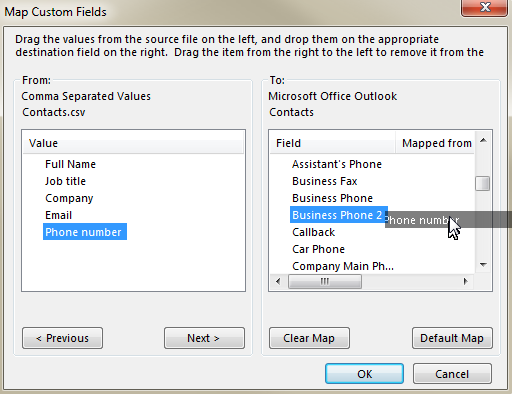


In the above cmdlet, replace with a mailbox user ID such as and provide the – PSTFolder_Path location by replacing in the command.
Export outlook contacts to csv 2010 update#
Export outlook contacts to csv 2010 full#
The command assigns “ UserName” full permission to the “ MailboxID” mailbox.

To export a global address book or contacts to PST/Excel/ CSV, a user must have the import/export role assigned and access to Exchange Management Shell. Steps to Export Exchange Contacts to PST/CSV by Using PowerShell Commandsĭepending upon the version of Exchange that you are using, here are the steps to export Exchange Contacts to PST/CSV through PowerShell. Export Exchange Contacts to PST/CSV by Using EDB to PST Converter.Steps to Export Exchange Contacts to PST/CSV by Using PowerShell Commands.However, if at any point you feel that it’s complex, taking time, or not working as you desire, you can use an EDB to PST converter software, such as Stellar Converter for EDB to export exchange contacts to PST/CSV in a few clicks. While the process to export users’ contacts from Exchange mailbox database (EDB) via PowerShell commands is tricky, we have tried to make it easier through step-by-step instructions. Plus, unlike snapshots, the PST file can be imported into any Outlook profile or Exchange server to access contacts Also, it will reduce dependability on the backup team and save time. This will help you export Exchange Contacts from selected mailboxes to PST file at a preferred location. To avoid this and quickly back up contacts from Exchange database anytime, you can use the New-Mailbo圎xportRequest PowerShell commands in Exchange Management Shell (EMS). To create a backup of contacts from selected mailboxes, you need to place a request to the backup department who creates a point-in-time snapshot of the “Contacts” folder for those mailboxes. In this post, we have discussed how you can export and backup Exchange Contacts to PST file by using PowerShell commands and an advanced tool. Thus, it’s important to back up the contacts from Exchange database regularly. However, the most crucial data for an organization are the contacts, especially those created by the marketing teams, that help connect with the customers, clients, and employees. Summary: Exchange mailbox database stores various information such as emails, contacts, attachments, journals, notes, etc.


 0 kommentar(er)
0 kommentar(er)
